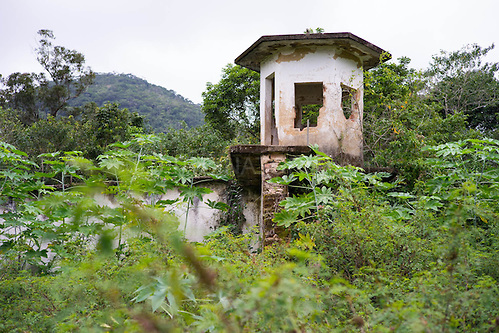“In a crumbling park in the crumbling back end of Copacabana, a woman stopped under an almond tree with a suitcase and a cigar. She was a round woman with a knob of gray hair pinned at the nape of her neck. After staring for a minute up into the tree, she bit into her cigar, lifted her suitcase onto the lowest branch, and climbed up after it….[Then] she opened a book across her lap as if she were sitting at a train station.”
 The woman who manages to get herself into the tree with her suitcase is not a typical protagonist, nor is she even typical of the people we come to know within the book as it develops. Beatriz Yagoda, sitting in her tree in the south of Rio, is a successful, middle-aged literary novelist, and she does not sit in the tree for very long. That night she disappears, and five days after that, her translator, Emma Neufeld, living in Pittsburgh, receives an e-mail from a stranger asking if she is aware that the woman for whom she has translated two novels is now missing in Brazil. Leaving her long-time lover, who has been planning their wedding, Emma immediately takes off to join Beatriz’s adult children as they try to find Beatriz somewhere in Rio or its environs. They all believe that Beatriz has an unfinished novel hiding somewhere, but when they check her computer, they discover not only the mysterious novel, with pages of what appears to be code, but evidence that Beatriz has spent over six hundred thousand dollars that she does not have, gambling on-line. Soon everyone is looking for Beatriz – her family, her translator, her publisher, and the loan shark who will stop at nothing to recoup the huge sum Beatriz owes him.
The woman who manages to get herself into the tree with her suitcase is not a typical protagonist, nor is she even typical of the people we come to know within the book as it develops. Beatriz Yagoda, sitting in her tree in the south of Rio, is a successful, middle-aged literary novelist, and she does not sit in the tree for very long. That night she disappears, and five days after that, her translator, Emma Neufeld, living in Pittsburgh, receives an e-mail from a stranger asking if she is aware that the woman for whom she has translated two novels is now missing in Brazil. Leaving her long-time lover, who has been planning their wedding, Emma immediately takes off to join Beatriz’s adult children as they try to find Beatriz somewhere in Rio or its environs. They all believe that Beatriz has an unfinished novel hiding somewhere, but when they check her computer, they discover not only the mysterious novel, with pages of what appears to be code, but evidence that Beatriz has spent over six hundred thousand dollars that she does not have, gambling on-line. Soon everyone is looking for Beatriz – her family, her translator, her publisher, and the loan shark who will stop at nothing to recoup the huge sum Beatriz owes him.
What evolves, while technically a mystery story, has elements of many different genres, as is befitting a novel about writing. Here author Idra Novey asks how much from an author’s real life migrates onto the printed page; about what, if anything, a careful reader may learn about an author’s inner life and thoughts from studying what s/he says in a novel; and about how much a translator can truly reflect an author’s inner essence. Within this debut novel, author Idra Novey, who is also a translator of novels in Portuguese and Spanish, brings the whole question of a translator’s role to the forefront. As Emma says of a passage from Beatriz’s writing which she has been reading aloud to someone unfamiliar with it, “Wasn’t the splendor of translation…to discover sentences this beautiful and then have the chance to make someone else hear their beauty who had yet to hear it? To arrive at least once, at a moment this intimate and singular, which would not be possible without these words arranged in this order on this page?”
Emma also points out some of the intricacies involved when a translator must choose exactly the right substitute for a word, maybe a word not available in other languages, and what happens to meaning when the word order of the “foreign” language must reflect the mood and intention of the author as it gets translated into a different language with a different word order. Even more of this hits home for translator Emma when she discovers that the man she met upon her arrival, the gun-toting Flamenguinho, who has threatened to kill her, Beatriz, and the family if he is not paid, is actually named for a red-bellied toad – “highly variable, often fatal.” “Oh god, she said in English, and all the terror she’d been denying in Portuguese released itself inside her.”

Before leaving for Ilha Grande, Emma eats the fish moquesa prepared by a neighborhood seller. She is seasick for the entire trip, an embarrassment photographed by a gossip columnist.
Staying in Beatriz’s apartment with her daughter Raquel and her son Marcus, who had “the same radioactive-green eyes and high cheekbones” as Beatriz, combined with a “sensual and sleepy stare,” Emma finds the obvious happening despite all the trauma and terrors facing Beatriz’s family. As suppositions begin to to be floated regarding her whereabouts, Emma recognizes some parallels with events and characters from books or stories written by Beatriz, and she and Marcus decide to look for her on Ilha Grande, a small island off the coast of Rio “with nothing on it but a [demolished] prison and an orchestra of three-toed lizards.” Raquel, far more practical and unappreciative of Emma and her literary work in the first place, goes her own way, trying to find her mother and stave off disaster. She does not believe that her mother will be on Ilha Grande, “surrounded by a bunch of bobos in flip-flops smoking pot while they texted on their iPhones.” And she has never read her mother’s books, which are generally recognized as “peculiar.” “She had no patience for the illusion that you could know someone because you knew her novels. What about knowing what a writer had never written down – wasn’t that the real knowledge of who she was?”
As the gun-toting Flamenguinho becomes ever more impatient for his money and the novel becomes more complex, Beatriz’s former publisher in Brazil, Roberto Rocha, quickly gets Beatriz’s first two novels into reprints, raising more money, though it is the profits from the US editions which may save Beatriz. Raquel begins reading her mother’s unfinished manuscript and changes her mind about reality and imagination and her previous non-belief that a writer could be “known” from his/her fiction, beginning now to consider whether, perhaps, “this half-finished story was [pure] fiction and only the details bore a resemblance to their family….Maybe the disdain Raquel had sensed that her mother’s friends felt about her lack of interest in literature wasn’t disdain at all, but unease with what they knew about her [mother] and she didn’t.”

The second writer to climb a tree and stay there, as Beatriz did, chose one in the Jardim de Ala Rio
Author Idra Novey keeps the novel from becoming top-heavy with “philosophizing” by including elements of humor, violence, mystery, and the silliness of newspaper gossip columns, and when another young writer climbs into a banyan tree in the Jardim de Ala, and is later found dead and castrated, the newspaper offers only this advice: “All you other authors out there in Rio, please, please stay out of the trees!” Different types of writing, from e-mails, to dictionary definitions, gossip columns, a poeticized depiction of a shooting, a court transcript, a newspaper article about the false arrest of a “guilty” party to a violent crime, all contribute to the atmosphere and speed of the narrative. And as Emma’s unimaginative boyfriend from home arrives to a situation which requires absolutely no imagination, the novel heads toward its quickly developing conclusion. Novey keeps the reader entertained and interested in many different subjects throughout, even including many different “ways to disappear,” and for readers who are looking for a well written, clever entertainment without all the heaviness of serious literary fiction, this is a good, light choice.
Photos, in order: The author’s photo is from http://arts.princeton.edu/people/profiles/inovey/
The red-bellied toad, for which Flamenguinho is named, appears on http://link.springer.com
Emma purchases fish moquesa from a nearby shop before she boards the ferry for Ilha Grande. One of the paparazzi publishes a photo of her being sick, as a result. http://whatsgabycooking.com
The guard tower on the abandoned prison on the Ilha Grande, photographed by Andrew Tobin, is found on http://tobinators.com/
The Jardim de Ala Rio, where another writer climbed a tree and planned to stay, is seen on https://www.pinterest.com/
ARC: Little Brown



